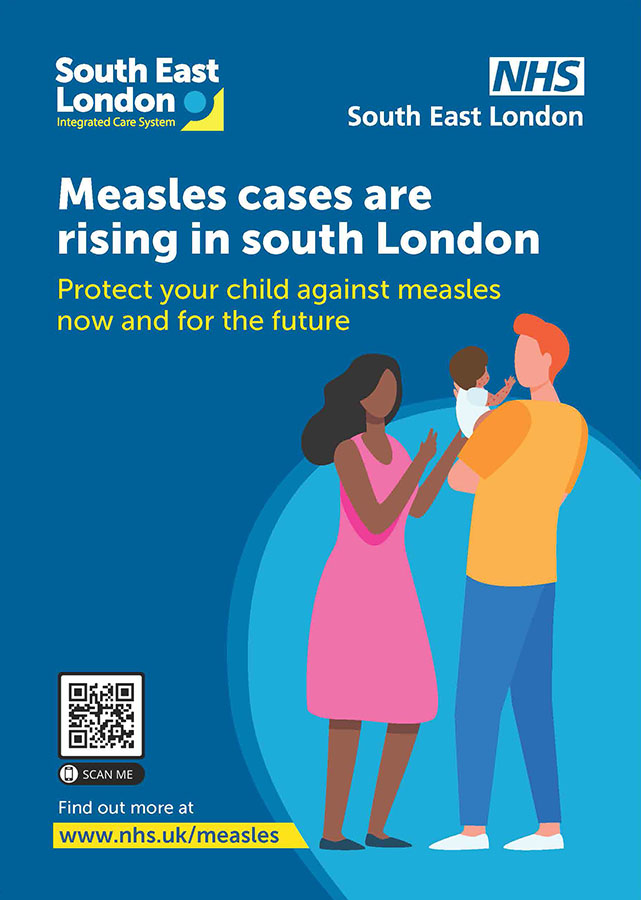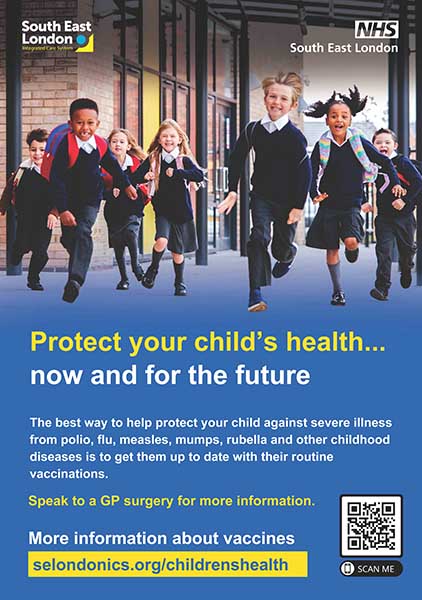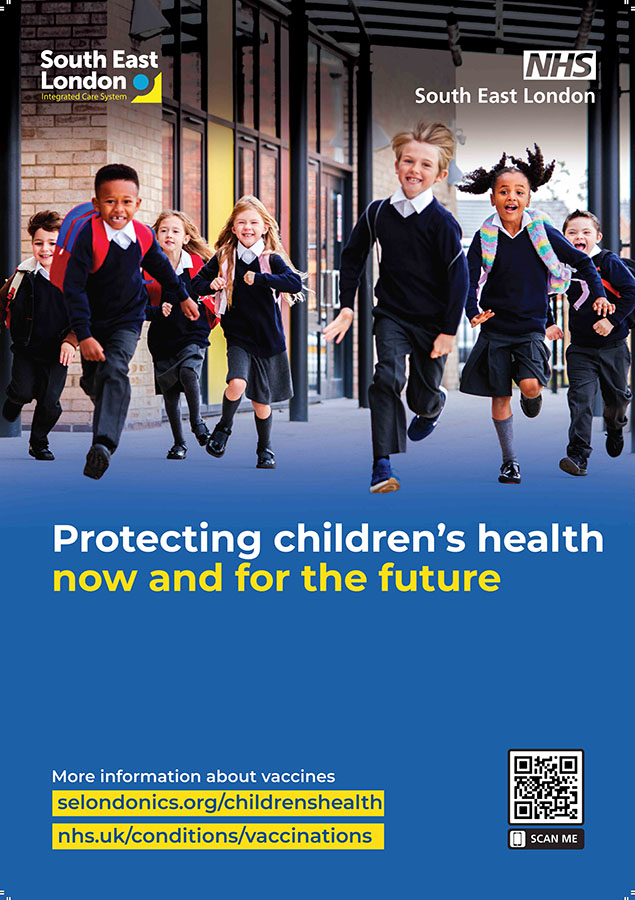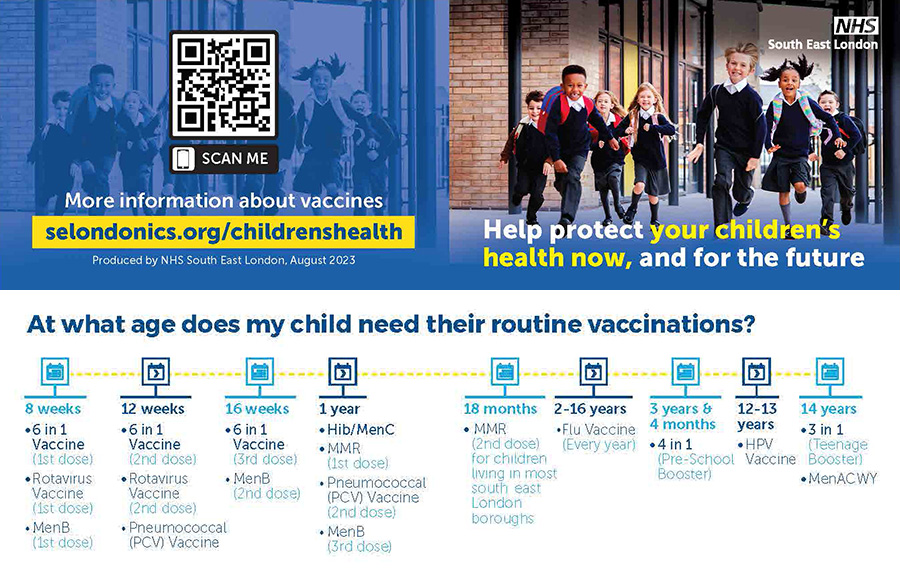
This page is designed to support health and care professionals in promoting the importance of vaccinations across our diverse communities in south east London. You can also signpost people to our public website page on children’s immunisations.
Vaccines and when children should have them
Our interactive online timeline shows when children are due their routine vaccinations.
The MMR vaccine
Updated: December 2024
The MMR vaccine, which protects against measles, mumps and rubella, has one of the lowest take up rates of all childhood immunisations.
Key information on MMR messages to give to parents and use on your websites and other channels:
- If your child has missed any of their MMR vaccinations, it’s never too late to catch up – check your child’s red book. If you don’t have a red book, contact your GP practice to find out if they are fully vaccinated.
- The MMR vaccine is safe and effective. It protects against three serious illnesses – measles, mumps and rubella. These are highly infectious conditions that can easily spread between unvaccinated people.
- The MMR vaccine is given in two doses – the first at one year old and the second at 18 months old in south east London. Two doses are needed for lifelong protection.
Jump to FAQs to support parent/carer conversations on MMR
Resources: promotional materials
We have produced various resources to help raise awareness of the importance of children’s immunisations.
You can download and print these locally.

Childhood immunisations A4 or A5 size posters available in:
British Society for Immunology video explaining vaccines to parents/carers
Frequently asked questions from parents and carers on MMR and suggested responses
What are measles, mumps and rubella?
Measles, mumps and rubella can spread easily between people and can lead to serious problems including meningitis, blindness and hearing loss.
They can also lead to complications in pregnancy that affect the unborn baby, and can lead to miscarriage or still birth.
Two doses of the MMR vaccine provides long-term protection against these diseases.
For more information on the MMR vaccine please visit MMR (measles, mumps and rubella) vaccine – NHS (www.nhs.uk)
What is the MMR vaccine?
The MMR vaccine protects against:
Babies and young children are given 2 doses of the MMR vaccine as part of the NHS vaccination schedule. They’re given a dose at 1 year old and 18 months old in south east London.
For more information on the MMR vaccine please visit MMR (measles, mumps and rubella) vaccine – NHS (www.nhs.uk)
How does the MMR vaccine work?
The MMR vaccine contains weakened versions of live measles, mumps and rubella viruses. The vaccine works by triggering the immune system to produce antibodies against measles, mumps and rubella.
If you or your child then comes into contact with one of the diseases, the immune system will recognise it and immediately produce the antibodies needed to fight it.
It’s not possible for people who have recently had the MMR vaccine to infect other people.
Is the MMR vaccine linked to autism?
There’s no evidence of any link between the MMR vaccine and autism. There are many studies that have investigated this.
There has been some controversy about whether the MMR vaccine might cause autism, following a 1998 study by Dr Andrew Wakefield. Andrew Wakefield’s work has since been completely discredited and he has been struck off as a doctor in the UK.
Where can I get further information on the MMR vaccine?
The Oxford University Vaccine Knowledge Project website has a list of MMR studies and their findings: https://vk.ovg.ox.ac.uk/mmr-vaccine
Tackling misconceptions on MMR: Addressing misconceptions on measles vaccination (europa.eu)
NHS MMR information: MMR (measles, mumps and rubella) vaccine – NHS (www.nhs.uk)
Frequently asked questions from parents and carers on other vaccinations issues and suggested responses
I don’t know if my child has had their jabs – how can I check?
You can check your child’s personal child health record, you might know it as the “red book”.
Most people are given it when their baby is born. If you don’t know where yours is don’t worry. You can ask your GP practice for your child’s vaccination record.
My child has missed their jabs – is it too late?
It’s never too late to catch up on these important vaccinations – you can still ask your GP surgery for the MMR vaccine if your child has missed either of these two doses.
Why do we vaccinate?
After clean water, vaccination is the most effective public health intervention. Vaccines protect you and your child from many serious and potentially deadly diseases. They undergo rigorous safety testing before being introduced and they’re also constantly monitored for side effects after being introduced.
All medicines and vaccines in use in the UK have been approved by the UK’s independent regulator. Thanks to vaccines, some diseases that used to kill or disable millions of people are seen very rarely. However, if people stop having vaccines, it’s possible for infectious diseases to quickly spread again.
How do I register with a GP?
Anyone in England can register with a GP surgery. It’s free to register. You do not need any proof of address or immigration status, ID or an NHS number.
You can find a GP local to you at www.nhs.uk/service-search/find-a-gp
You can register online or in person.



